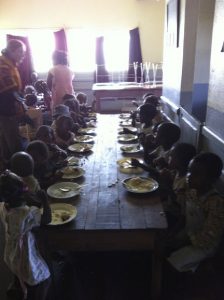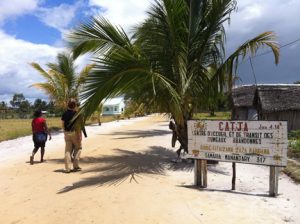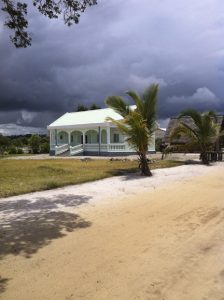 Location
Location
Mananjary commune, Manakara District, Madagascar
Community Description
Mananjary is a seaside town in southeast Madagascar that is home to nearly 30,000 Malagasy whose livelihoods are very much integrated with their natural surroundings. The area is awash with fishermen while the market displays the daily catches and the usual offerings of indigenous fruits, vegetables, legumes, and non-food stuff.
On the northern edge of the town is a marvelous plantation that is home to Le Centre d’Accueil et de Transit des Jumeaux Abandonné (CATJA), an orphanage for abandoned twin children.
The dominant ethnic group in the region has a long-standing, yet not universally held, belief that the birth of twin children will beget a life of torment and ailments for both the children and their mother. Thus, upon birth, some children are either abandoned, while the more lucky ones are brought to Mdme. Julie Rasoarinanana, is the director and overseer of nearly 100 children currently.
Run as a non-governmental, non-profit agency for the care and adoption of Malagasy children, the center is a model of love and care that is so profoundly witnessed in Madagascar. In addition to the 92 children in their care, CATJA boasts a staff of 25, consisting of caregivers, infant and toddler specialists, support staff, and even a number of agricultural experts who care for their expansive sustenance garden and five acres of rice fields.
Problem Addressed
Mananjary, like most coastal regions of Madagascar, is prone to a hot, rainy season from October to March followed by a dry, cooler season that is witness to very little rainfall. The need to secure and allocate the natural resources at their disposal has led to an extensive rice-farming plot and a garden that provides nourishment for the children.
Torrential rains are frequent during the warmer months, causing water runoff from buildings across the over-saturated ground.
The newest dormitory, completed in 2009 by an Italian builder, contains a slant tin roof that catches rainwater into a gutter system that dispenses of the water at the rear base of the building. The rains have created an extensive sinkhole that is creeping towards the footings of the building itself. Moreover, two other dormitories also have a type of water diversion structure at their roof edge, although the precipitate is simply diverted to the surrounding sandy soils, which have a very high saturation point.
Project Description
This project is to build a rainwater harvesting system and to remediate flooding problems, for the three largest dormitories on the CATJA complex.
The diversion systems of the three buildings will be modified to include a rainwater harvesting system employed at each of the downspouts currently in use. While all buildings will require a retrofit of the existing collection system, one building will require extensive reconstruction of the gutter system that is currently in a state of disrepair.
Eight drums for the collection of rainwater will be purchased and installed, along with the necessary PVC piping and connections to ensure a simple filter system at the drum supply, and the required components for a threaded-connection tap at the base of each unit for the use of the stored water.
Water Charity funds will pay for the drums, hardware, materials, and a few necessary tools (hand saw, hand drill for the tap).
CATJA will manage and pay for the installation of the system by a field staff of three constructors, as well as oversee the bidding and purchasing of the materials from local vendors, and the maintenance of the system.
Project Impact
125 people will benefit from the project.
Peace Corps Volunteer Directing Project
Patrick Spencer
Comments
This is an important infrastructure project for the orphanage. It will result in a new and reliable water source, as well as establish a rainwater management system that eliminates adverse impacts on the buildings and their surroundings.
D ollar Amount of Project
ollar Amount of Project
$500.00
Donations Collected to Date
$335.00
ADOPT THIS PROJECT BY CONTRIBUTING THE DOLLAR AMOUNT NEEDED BELOW
Donations of any amount will be appreciated. The full amount will give you “naming rights”, if that is something you would like.
Any contributions in excess of the Dollar Amount of the Project will be allocated to other projects directed by this PCV and/or projects of other PCVs in this country.
Dollar Amount Needed
$165.00
![]() This project has been finished. To read about the conclusion of the project, CLICK HERE.
This project has been finished. To read about the conclusion of the project, CLICK HERE.